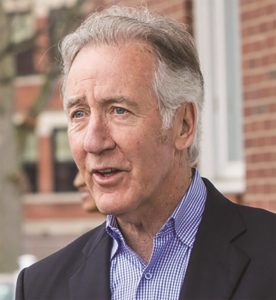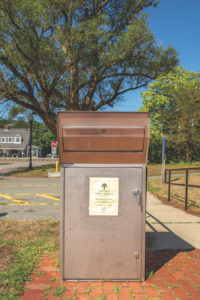PROVINCETOWN — A Democratic congressional primary race in Western Massachusetts wouldn’t normally make the news on Cape Cod. But the race for the nomination in the rural 1st district, covering about one-third of the state, attracted statewide and national attention when accusations emerged that the challenger, 31-year-old Holyoke Mayor Alex Morse, had abused his power to have sexual relationships with college students.
That’s when the Cape and Islands state senator, Julian Cyr of Truro, got involved.

Morse, who is gay, responded to the reports by acknowledging that he had had sexual relationships with adult college students. But he said he had never hurt anyone, nor abused his power.
For several days, Morse was treated like a predator, and a goner. Most of the organizations that had endorsed him backed away, and he considered dropping out of the race.
The LGBTQ Victory Fund decried the “vague and anonymous allegations,” however, and so did Cyr. In an Aug. 12 statement, Cyr, who is also gay, wrote that “this race will set a precedent for whether vague and anonymous allegations can be easily launched against LGBTQ candidates to destroy their campaigns.
“The sex lives of LGBTQ people are too often sensationalized in politics and in media,” Cyr wrote. “The way these allegations have been brought [will] have a chilling effect on the willingness of LGBTQ people to run for public office.”
The allegations of abusive behavior collapsed under serious scrutiny. The prime mover of the story, it turned out, was hoping to land a job with the incumbent, Democrat Richard Neal, the powerful chair of the House Ways and Means Committee, who has been in Congress for 31 years. A months-long effort to entrap Morse in bad behavior had produced nothing beyond innocuous conversations on Instagram.

On Aug. 13, MassEquality put out a statement. “These allegations have been widely publicized and repeated as fact by the Massachusetts media and establishment, without substantiation or even anecdotal evidence of wrongdoing,” it said. “It has now come to light that these accusations were made as a politically motivated attack, feeding into the homophobic trope of gay men as predators and pedophiles.”
On Aug. 15, the Bay State Stonewall Democrats called for an investigation. “The alleged months-long effort by individuals in [the College Democrats of Massachusetts] to gaybait, entrap, and lure Mayor Morse into compromising, embarrassing, or politically taboo situations is an unacceptable, yet familiar, homophobic tactic that is maliciously damaging,” they said.
Almost two weeks later, the allegations have dropped away. The groups that had endorsed Morse previously have re-endorsed him. The state party is organizing an investigation into the College Democrats who launched the attack and the state party leaders who advised them. Morse says his private polling shows him gaining ground, and he benefited from a fundraising surge as well.
Even two weeks later, however, almost no other gay elected official has made a statement like Cyr’s. State Rep. Daniel Hernandez Jr. of Arizona retweeted Cyr’s statement, and so did state Sen. Jeremy Moss of Michigan. Those are the only statements above the city-councilor level that the Independent or the Victory Fund could identify.
The Independent contacted all seven LGBTQ members of the U.S. House (David Cicilline of Rhode Island, Chris Pappas of New Hampshire, Sean Maloney of New York, Angie Craig of Minnesota, Sharice Davids of Kansas, Mark Pocan of Wisconsin, and Mark Takano of California), plus two LGBTQ candidates who recently won primary elections in heavily Democratic districts (Mondaire Jones and Ritchie Torres, both of New York).
None of the nine responded to multiple requests for comment on Cyr’s statement — specifically, his warning about the risk to future gay candidates. Gay organizations have spoken about these events, but when it comes to elected leaders, Cyr stands nearly alone.

On Monday, Aug. 24, the LGBTQ Victory Fund organized an online conversation between Cyr and Morse. In it, Cyr expanded on his concerns.
“I have a lot of thoughts about this,” Cyr said. “Every LGBTQ person I’ve talked to does. There’s something fundamentally vulnerable about the dating lives of LGBTQ candidates actually being used against them.
“That’s why this incident is so important, how we handle this,” Cyr continued. “We saw this happen to Gerry Studds; we saw this happen to Barney Frank; we saw this happen more recently to Katie Hill. I hope this can be a turning point. I want to look back in a few years and say, ‘Remember when someone tried to do that to Alex Morse? Here was the response, here was the outcome. He’s now serving in Congress, and that stuff doesn’t happen anymore.’ ”

